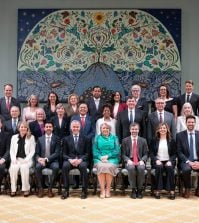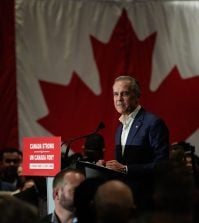Janice Charette, Canadian High Commissioner to the UK: Exclusive Interview

Former Canadian civil service chief Janice Charette now represents her country at the Court of St James, serving as High Commissioner to the UK. Tania Mason learns about her career, her new job, and the challenges of moving from the centre of government to its overseas outposts
As one of a tiny handful of women who’ve led a national civil service, you might imagine that Canada’s Janice Charette has a unique insight on how to climb to the top of the greasy pole. And not only was she Canada’s Clerk of the Privy Council – the civil service chief, ‘deputy minister’ to the PM, and Secretary to the Cabinet – but she occupied that role in a country which has done extraordinarily well in moving towards gender parity amongst its top civil servants. Canada has just topped the 2017 Women Leaders Index, which ranks G20 countries according to the proportion of women amongst their senior civil servants, and has held the top slot ever since the Index was launched four years ago.
Yet attitudes to gender equality and female advancement have been progressive in Canada for so long that, despite Charette’s 30 year career in the civil service, she’s never had the sense that she was struggling to break through glass ceilings or challenge institutional sexism. “I have worked in the public sector for most of my career, since the mid-80s, and I would say that throughout the time I was thinking about breaking into the executive ranks, it was always the fact that there was a very good representation of women in those leadership positions,” she says. “I was the second woman to be appointed as the Clerk of the Privy Council, and there have been women leaders in both the number one and number two jobs across ministries in the government of Canada.”
So Charette didn’t have to blaze a new trail to the top: she was following a path worn by the “men who created the room for women to be able to achieve these positions, and the women who stepped up to take them on”. And this path itself was laid down by a range of voluntary affirmative action initiatives in the 1980s, some of which were given legislative force in the ‘90s. By the time Global Government Forum began tracking the proportion of women in civil service leadership positions across the G20 in 2013, Canada already had 45% women amongst its top five grades; the proportion has since inched up to 46.5%.
Yet Charette cannot recall any specific initiatives with the civil service aimed at increasing female representation; she believes Canada’s success is down to the “sustained attention” given to diversity issues, and the country’s fostering of a strong pipeline of female talent.
From cabinet to commissioner
Charette was promoted to Clerk of the Privy Council in October 2014 after four years as Deputy Clerk and Associate Secretary to the Cabinet, but did not survive the transition to the newly-elected Trudeau government. In July last year it was announced that she would become Canada’s High Commissioner to the UK, and she took on the role in September.
Despite losing her previous job to her male deputy Michael Wernick – himself interviewed by Global Government Forum in October last year – Charette has nothing but praise for Trudeau’s efforts to advance the cause of women leaders. The new premier has achieved gender parity in his cabinet, and “there has been a real effort to improve the numbers of women in diplomatic positions abroad,” Charette says. “I am the second woman in this role as High Commissioner to the UK, but my predecessor Jean Casselman Wadds was appointed in 1979, so it’s been a long time. I think it’s a matter of real purposeful effort and the Prime Minister and former and current ministers of foreign affairs have been very committed to that.”
Female ambassadors remain in the minority in the UK diplomatic community, “but I don’t feel lonely”, she adds. “It’s still male-dominated, but the UK has some very highly talented and competent professional women in leadership positions – the Prime Minister, Her Majesty, the Secretary General of the Commonwealth are all women.”
However, when pressed to offer her views on whether women in more socially conservative countries have a harder time getting promoted, or whether international organisations such as the World Bank and United Nations are doing enough to promote women through their ranks, she slips into full-on diplomatic mode. “I don’t have a sense of that,” she says. “And I don’t have experience of working directly with those organisations, so I wouldn’t want to comment.”
On Brexit
She’s similarly discreet when asked about the UK’s Brexit negotiations. Charette was Clerk to the Privy Council during the last part of Canada’s efforts to settle its trade deal with the EU – a process which ended up taking over seven years. She says that negotiating with the EU requires “a very clear understanding of what you’re trying to get out of it, and the patience and determination to be able to drive it to a conclusion”. Of course, she says, the UK’s relationship with the EU is in a very different place from Canada’s, so there is a limit to the lessons that can be learned from the Canadian-EU trade talks.
“Because it’s a 40-plus-year relationship between the UK and EU, you’re now moving to define a different type of relationship, which is different to a trade agreement with tariff lines and service levels and customs and facilitation,” she says. “That was a very complex agreement, but the negotiation of a new relationship between the EU and UK is an even more complex undertaking.
“Our interest is to see that the UK emerges from it as a strong constructive partner for Canada, and that the EU emerges as a strong constructive partner for Canada – we have no intention of taking sides on this – and, most importantly, that the UK and EU continue to have a strong constructive and well-functioning partnership between them. Of course there are going to be challenges, but a commitment to mutual success is really important here.”
Turning inside out
Charette admits she has had to develop “more depth in the trade and economy space” in order to represent Canada’s interests across the UK – but, after a career immersed in the internal workings of government, an even bigger challenge has been the increased focus on external communications.
“You’re still in service to your country, so you’re still committed to the same set of fundamental values that guide your behaviour, but what you do every day is very different in this job,” she comments. “I’ve gone from a role at the head of the public service in Canada, adviser to the Prime Minister, to Cabinet – which is very much a job focused on the inside of government – to one where my role is to promote Canada’s interests here in the UK, very much an external-facing job.
“So where I used to collect up intelligence and information and then the channel for expression of that was inside, now I collect up internal input and transform that into communications with decision-makers and influencers here in the UK.”
One of the new competencies she has had to master is the use of social media: on the day of our conversation, she was composing a tweet about “our thanks and admiration for the Duke of Edinburgh for his incredible service to Canada”. She seems to have got the hang of it: followers of @JaniceCharette have been treated to more than 1,100 tweets from the account since it opened. Yet she confesses it is “different being on the podium, as opposed to being the person who writes the lines for the person on the podium”.
She smoothly deflects a question about whether she misses being at the centre of power. “It’s just a different centre to be in,” she says. “I’m not in Ottawa; I’m in one of the greatest capitals of the world, a hugely important partner for Canada. The UK is the largest of Canada’s trading partners in Europe, and has been a historic partner with shared history, language – we share a monarch, we’re partners in the Commonwealth. I may not be at the centre in Ottawa, but I think it’s a very important job to be able to represent Canada here in the UK.”
The Women Leaders Index 2017 was launched earlier this week: you can explore all the findings and analysis here





















